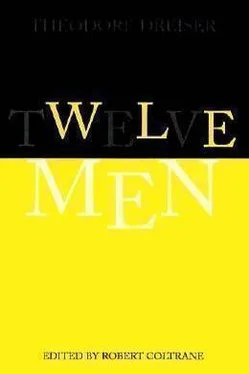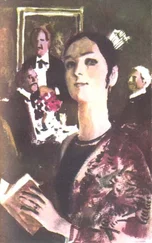Теодор Драйзер - Twelve Men
Здесь есть возможность читать онлайн «Теодор Драйзер - Twelve Men» весь текст электронной книги совершенно бесплатно (целиком полную версию без сокращений). В некоторых случаях можно слушать аудио, скачать через торрент в формате fb2 и присутствует краткое содержание. Год выпуска: 2014, Издательство: epubBooks Classics, Жанр: Биографии и Мемуары, на английском языке. Описание произведения, (предисловие) а так же отзывы посетителей доступны на портале библиотеки ЛибКат.
- Название:Twelve Men
- Автор:
- Издательство:epubBooks Classics
- Жанр:
- Год:2014
- ISBN:нет данных
- Рейтинг книги:4 / 5. Голосов: 1
-
Избранное:Добавить в избранное
- Отзывы:
-
Ваша оценка:
- 80
- 1
- 2
- 3
- 4
- 5
Twelve Men: краткое содержание, описание и аннотация
Предлагаем к чтению аннотацию, описание, краткое содержание или предисловие (зависит от того, что написал сам автор книги «Twelve Men»). Если вы не нашли необходимую информацию о книге — напишите в комментариях, мы постараемся отыскать её.
Twelve Men — читать онлайн бесплатно полную книгу (весь текст) целиком
Ниже представлен текст книги, разбитый по страницам. Система сохранения места последней прочитанной страницы, позволяет с удобством читать онлайн бесплатно книгу «Twelve Men», без необходимости каждый раз заново искать на чём Вы остановились. Поставьте закладку, и сможете в любой момент перейти на страницу, на которой закончили чтение.
Интервал:
Закладка:
P.S. As for the sum total of the work left by L―, its very best, it might be said that although he was not a great psychologist, still, owing to a certain pretentiousness of assertion at times, one might unthinkingly suppose he was. Neither had he, as yet, any fixed theories of art or definite style of his own, imitating as he was now de Maupassant, now O. Henry, now Poe; but also it must be said that slowly and surely he was approximating one, original and forceful and water–clear in expression and naturalness. At times he veered to a rather showy technique, at others to a cold and even harsh simplicity. Yet always in the main he had color, beauty, emotion, poignance when necessary. Like his idol, de Maupassant, he had no moral or strong social prejudices, no really great or disturbing imagination, no wealth of perplexing ideas. He saw America and life as something to be painted as all masters see life and paint it. Gifted with a true vein of satire, he had not, at the time of his death, quite mastered its possibilities. He still retained prejudice of one type or another, which he permitted to interfere with the very smooth arrangement of his colors. At the same time, had he not been disturbed by so many of the things which in America, as elsewhere, ordinarily assail an ambitious and earnest writer—the prejudice against naturalness and sincerity in matters of the intellect and the facts of life, and the consequent difficulty of any one so gifted in obtaining funds at any time—he might have done much better sooner. He was certain to come into his own eventually had he lived. His very accurate and sensitive powers of observation, his literary taste, his energy and pride in his work, were destined to carry him there. It could not have been otherwise. Ten years more, judging by the rate at which he worked, his annual product and that which he did leave, one might say that in the pantheon of American letters it is certain that he would have proved a durable if not one of its great figures, and he might well have been that. As it stands, it is not impossible that he will be so recognized, if for no more than the sure promise of his genius.
The Village Feudists
In a certain Connecticut fishing–town sometime since, where, besides lobstering, a shipyard and some sail–boat–building there existed the several shops and stores which catered to the wants of those who labored in those lines, there dwelt a groceryman by the name of Elihu Burridge, whose life and methods strongly point the moral and social successes and failures of the rural man.
Sixty years of age, with the vanities and desires of the average man's life behind rather than before him, he was at the time not unlike the conventional drawings of Parson Thirdly, which graced the humorous papers of that day. Two moon–shaped eyes, a long upper lip, a mouth like the sickle moon turned downward, prominent ears, a rather long face and a mutton–chop–shaped whisker on either cheek, served to give him that clerical appearance which the humorous artists so religiously seek to depict. Add to this that he was middle–sized, clerically spare in form, reserved and quiet in demeanor, and one can see how he might very readily give the impression of being a minister. His clothes, however, were old, his trousers torn but neatly mended, his little blue gingham jumper which he wore about the store greasy and aged. Everything about him and his store was so still and dark that one might have been inclined on first sight to consider him crusty and morose.
Even more remarkable than himself, however, was his store. I have seen many in my time that were striking because of their neatness; I never saw one before that struck me as more remarkable for its disorder. In the first place it was filled neck–deep with barrels and boxes in the utmost confusion. Dark, greasy, provision–lined alleys led off into dingy sections which the eye could not penetrate. Old signs hung about, advertising things which had long since ceased to sell and were forgotten by the public. There were pictures in once gilt but now time–blackened frames, wherein queerly depicted children and pompous–looking grocers offered one commodity and another, all now almost obliterated by fly–specks. Shelves were marked on the walls by signs now nearly illegible. Cobwebs hung thickly from corners and pillars. There were oil, lard, and a dust–laden scum of some sort on three of the numerous scales with which he occasionally weighed things and on many exteriors of once salable articles. Pork, lard, molasses, and nails were packed in different corners of the place in barrels. Lying about were household utensils, ship–rigging, furniture and a hundred other things which had nothing to do with the grocery business.
As I entered the store the first afternoon I noticed a Bible open at Judges and a number of slips of paper on which questions had been written. On my second visit for oil and vinegar, two strangers from off a vagrant yacht which had entered the little harbor nudged one another and demanded to know whether either had ever seen anything like it. On the third, my companion protested that it was not clean, and seeing that there were other stores we decided to buy our things elsewhere. This was not so easily accomplished.
"Where can I get a flatiron?" I inquired at the Postoffice when I first entered the village.
"Most likely at Burridge's," was the reply.
"Do you know where I can get a pair of row–locks?" I asked of a boy who was lounging about the town dock.
"At Burridge's," he replied.
When we wanted oars, pickles of a certain variety, golden syrup, and a dozen other things which were essential at times, we were compelled to go to Burridge's, so that at last he obtained a very fair portion of our trade despite the condition of his store.
During all these earlier dealings there cropped up something curt and dry in his conversation. One day we lost a fruit jar which he had loaned, and I took one very much like it back in its place. When I began to apologize he interrupted me with, "A jar's a jar, isn't it?"
Another time, when I remarked in a conciliatory tone that he owed me eight cents for a can of potted ham which had proved stale, he exclaimed, "Well, I won't owe you long," and forthwith pulled the money out of the loose jacket of his jumper and paid me.
I inquired one day if a certain thing were good. "If it isn't," he replied, with a peculiar elevation of the eyebrows, "your money is. You can have that back."
"That's the way you do business, is it?"
"Yes, sir," he replied, and his long upper lip thinned out along the line of the lower one like a vise.
I was in search of a rocking–chair one day and was directed to Burridge's as the only place likely to have any!
"Do you keep furniture?" I inquired.
"Some," he said.
"Have you a rocking–chair?"
"No, sir."
A day or two later I was in search of a table and on going to Burridge's found that he had gone to a neighboring city.
"Have you got a table?" I inquired of the clerk.
"I don't know," he replied. "There's some furniture in the back room, but I don't know as I dare to sell any of it while he's away."
"Why?"
"Well, he don't like me to sell any of it. He's kind of queer that way. I dunno what he intends to do with it. Gar!" he added in a strangely electric way, "he's a queer man! He's got a lot of things back there—chairs and tables and everything. He's got a lot more in a loft up the street here. He never seems to want to sell any of 'em. Heard him tell people he didn't have any."
I shook my head in puzzled desperation.
"Come on, let's go back and look anyway. There's no harm in seeing if he has one."
We went back and there amid pork and molasses barrels, old papers, boxes and signs, was furniture in considerable quantity—tables, rocking–chairs, washstands, bureaus—all cornered and tumbled about.
Читать дальшеИнтервал:
Закладка:
Похожие книги на «Twelve Men»
Представляем Вашему вниманию похожие книги на «Twelve Men» списком для выбора. Мы отобрали схожую по названию и смыслу литературу в надежде предоставить читателям больше вариантов отыскать новые, интересные, ещё непрочитанные произведения.
Обсуждение, отзывы о книге «Twelve Men» и просто собственные мнения читателей. Оставьте ваши комментарии, напишите, что Вы думаете о произведении, его смысле или главных героях. Укажите что конкретно понравилось, а что нет, и почему Вы так считаете.









